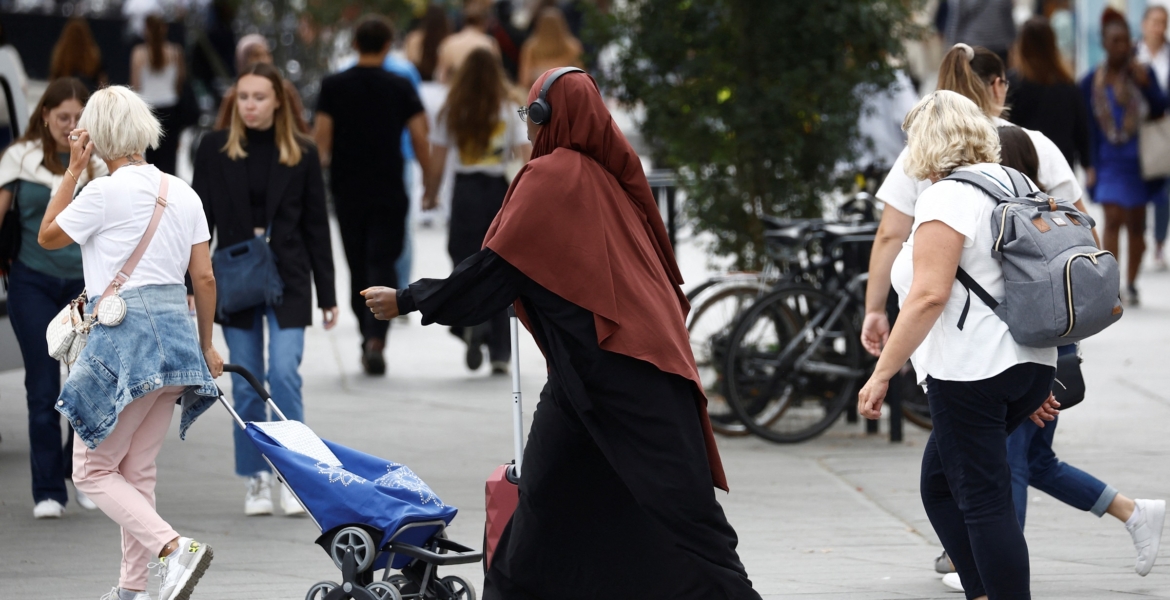Three years ago, in search of better opportunities, 30-year-old Egyptian scientific project manager, Mariam Mahdy, moved to France. While she found a suitable job in her field, the growing anti-immigrant sentiment in Europe made her feel unwelcome and scared.
“Some people treat me as if I am a burden, taking someone else’s place,” she said. “I will never be at home in France.”
Mahdy moved to Lyon, France to pursue a better education in her field, neuroscience, which has limited prospects in Egypt, according to her. She is among nine million Egyptians who live abroad and one of the 12.8 percent who live in Europe, according to the Central Agency for Public Mobilization and Statistics (CAPMAS) 2019 report.
Egyptians who migrate abroad are often motivated by economic factors and the pursuit of employment opportunities, according to the European Union Migration Drivers Report of 2022.
With the core inflation rate in Egypt averaging 11.97 percent from 2005 to 2024, and the Egyptian Pound sharply depreciating this year and for the fourth time since March 2022, some Egyptians living in Egypt face economic instability and aspire to move abroad for better opportunities.
Others, such as Syrians, Afghans, and Iraqis, move abroad to flee their war-stricken countries, similar to the situation in 2015, when more than one million people from the three nations and other countries moved to Europe, causing the 2015 European migrant crisis.
Europe’s reaction to the immigration crisis
Since then, European migration policies have become much stricter over the last decade. Fueled by the housing affordability crisis in Europe, which left many young people financially strained, and the perception in rural areas that migration threatens jobs and cultural stability, opposition to immigration and anti-immigration sentiment grew, taking center stage.
For the past eight years, the European Union’s (EU) has been discussing the “Migration Pact,” which tightens immigration policies. The pact was adopted by the European Parliament and Council in late 2023 and entered into force on 11 June 2024, to be applied after two years.
The pact, approved by the 27 EU member states, including Austria, Denmark, Finland, France, Germany, Greece, Hungary, Ireland, Italy, Netherlands, Poland, Spain, and Sweden, covers all stages of the asylum process, from screening asylum seekers upon arrival to collecting biometric data, raised concerns among human rights organizations.
The enforcement of stricter immigration policies has already begun. In September 2024, Germany reinstated border checks across all its land boundaries, a sign of a shift in its immigration policy. France followed suit, pledging to restore “order on [our] frontiers.” Meanwhile, the Netherlands unveiled what it described as its “toughest ever asylum policy.” Similarly, Sweden and Finland proposed stringent new anti-migration laws.
The meaning of the word “immigrant,” has also shifted along with the shifts in political and cultural movements.
“I have been called an immigrant as an insult,” Mahdy shared, wondering when being an immigrant started carrying negative connotations. While the anti-immigration sentiment does not affect her daily life, it makes her feel scared for her future.
Much like Mahdy, Youssef Khaled, a 27-year-old software developer, lives in fear.
“I moved to Dresden, Germany six years ago to pursue a computer science bachelor’s degree,” he told Egyptian Streets. “The anti-immigration sentiment here makes me feel unsafe and disrupts my sense of belonging in the community.”
Living in eastern Germany, he regularly hears about incidents targeting immigrants, which only adds to his sense of fear and pressure.
Additionally, European migration policies have become inclined to extreme beliefs with a focus on excluding non-Europeans. Ukrainian refugees, unlike their Middle Eastern and African counterparts, were not part of the EU’s provisions, the EU announced, raising the question about the consistency of international law, suggesting that its application might be selective.
“As a Muslim Arab, who doesn’t look European, I feel unsafe, especially because all of the media propaganda is against Muslim Arabs,” Mahdy noted.
Khaled echoes Mahdy’s sentiments, sharing that when it comes to finding housing or applying for jobs, he has been turned down by landlords and employees simply because of his non-German name.
“It had nothing to do with my ability to pay rent or my professional qualifications,” Khaled said, adding that the experience of discrimination extends to the foreigners’ office, where he feels unwelcome and overwhelmed, as “the amount of bureaucratic demands feels unreachable and impossible.”
The rise of far right politics in Europe
According to the Encyclopedia of Politics by Rodney P Carlisle, far-right politics include “persons or groups who hold extreme nationalist, xenophobic, homophobic, racist, religious fundamentalist, or other reactionary views.” The term “far right” usually refers to fascists and neo-Nazis, but it can also describe groups to the right of mainstream right-wing politics.
Far-right political parties are groups that typically adhere to extremely conservative, nationalist, or authoritarian ideologies, drawing on elements of European ideological history, including nationalism, Counter-Enlightenment ideas, which is an intellectual stance that emerged in the late 18th century, and authoritarian politics.
Its contemporary platform centers on three main ideas: the promotion of ethnic and national identity, opposition to immigration, and a populist critique of political establishments.
Additionally, research suggests a growing surge of far-right support among young people. In parts of Europe, younger generations hold more anti-immigration views than their elders, according to a survey analysis by The Guardian.
Polling data in Eastern Europe shows Generation (Gen) Z, those born after 1997, and millennials, born between 1981 and 1996, are more likely to express negative attitudes toward immigration than Gen X, born between 1965 and 1980, or baby boomers, born between 1946 and 1964.
While baby boomers remain the most anti-immigration generation in Europe, millennials and Gen Z in some countries hold equally or more negative views on immigration from outside the EU.
“I don’t think the latest immigration policies represent the attitudes of Germans,” Khaled told Egyptian Streets, explaining that some lean left, supporting immigrants, while others express concerns over immigration and cultural integration.
Mahdy, on the other hand, generally feels alienated in France. “I see far right parties gaining more power every day, and it makes me unsure of the future.”
As of 30 September, seven EU member states, including Croatia, the Czech Republic, Finland, Hungary, Italy, the Netherlands, and Slovakia, have far-right parties in government. In France, the far-right political party National Rally (RN) and Germany’s Alternative für Deutschland (AfD) are gaining traction.
For those aspiring to move to Europe, it will be harder than before to achieve and survive, Mahdy shared. “I think this could make Egyptians living in Europe return to Egypt after gaining permanent residency or citizenship, to escape discrimination.”
On the other hand, Khaled believes that while stricter immigration policies and anti-immigrant sentiment in Europe could make it hard for non-Europeans to move and settle there, there are still many supportive communities and plenty of opportunities for those who do.
As anti-immigrant sentiment and tighter policies sweep across Europe, Egyptians find themselves caught between hope for a better life and the harsh reality of growing exclusion.







Comment (1)
Unfortunately reading this article triggers the sad feelings of the discrimination against the Christians in the Islamic Egypt.